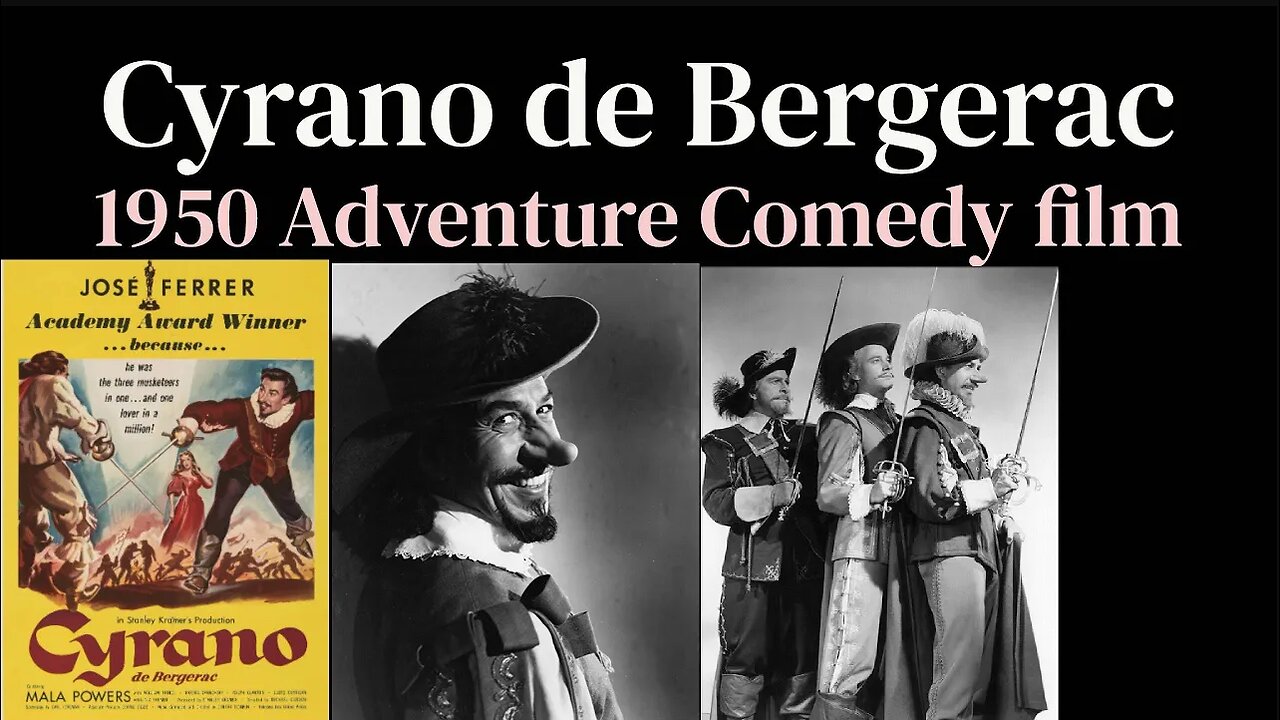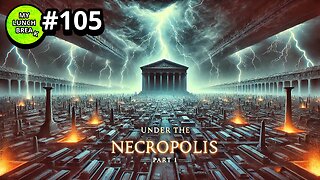Premium Only Content

Cyrano de Bergerac (1950 American Adventure Comedy film)
Cyrano de Bergerac is a 1950 American adventure comedy film based on the 1897 French Alexandrin verse drama Cyrano de Bergerac by Edmond Rostand. It uses poet Brian Hooker's 1923 English blank verse translation as the basis for its screenplay. The film was the first motion picture version in English of Rostand's play, though there were several earlier adaptations in different languages.
The 1950 film was produced by Stanley Kramer and directed by Michael Gordon. José Ferrer received the Academy Award for Best Actor for his starring performance as Cyrano de Bergerac. Mala Powers played Roxane, and William Prince portrayed Christian de Neuvillette.
Plot
In seventeenth-century Paris, poet and supreme swordsman Cyrano de Bergerac (José Ferrer) stops a play from being shown because he ostensibly cannot stand the bombastic style of the principal actor, Montfleury (Arthur Blake).
An annoyed aristocratic fop, the Vicomte de Valvert (Albert Cavens), provokes him into a duel by tritely insulting Cyrano's enormous nose. Cyrano first mocks his lack of wit, improvising numerous inventive ways in which Valvert could have phrased it (much to the amusement of the audience). He then composes a ballade for the occasion on the spot and recites it during the sword fight. With the last line, he stabs his opponent.
Cast
José Ferrer as Cyrano de Bergerac
Mala Powers as Roxane
William Prince as Christian de Neuvillette
Morris Carnovsky as Le Bret
Ralph Clanton as Antoine, Comte de Guiche
Lloyd Corrigan as Ragueneau
Virginia Farmer as Roxane's duenna
Edgar Barrier as Cardinal Richelieu
Elena Verdugo as the Orange Girl
Albert Cavens as the Viscount de Valvert
Arthur Blake as Montfleury
Don Beddoe as The Meddler
Percy Helton as Bellerose
Francis Pierlot as Monk
Production
The film was produced on a significantly lower budget than most costume dramas, because the producers were afraid that it would fail at the box office (it did). The sparseness of the sets is concealed by camera angles and by the lighting. Darkness is frequently used to hide the fact that the production design was not especially elaborate.
The film was one of the first to employ the then-new Western Electric magnetic sound recording system, which would become commonplace by 1953 and which was a necessity for stereo sound recording and reproduction.
Additions to the screenplay
The screenplay for the film, written by Carl Foreman, was mostly faithful to the play and to Brian Hooker's translation, though it was trimmed to 113 minutes (Cyrano plays for more than two-and-a-half hours onstage). However, Foreman did add his own dialogue for two or three additional scenes inserted into the film for better continuity between the five acts of the original play, and these are obviously not in verse.
The play characters of Le Bret and Carbon de Castel-Jaloux were combined, as were those of Ragueneau and Ligniere (although Ragueneau is not a drunk in the film). Le Bret consequently has a much larger and more important role in the film than in the play, and Ragueneau's role is slightly increased by his being the one threatened by a hundred ruffians that Cyrano fights off. The fight is shown in the film; in the play it takes place offstage between Acts I and II.
The role of the unnamed cardinal (Richelieu, to judge from his appearance) was specially written for the film.
In the film, Cyrano dies after being trampled by a carriage as part of an ambush rather than by being hit on the head by a falling log as in the play. As with the fight against the hundred ruffians, the fatal attack on Cyrano is shown onscreen rather than taking place offstage (in the play it takes place between Acts IV and V). Previous to the attack, there is a new scene in the film in which his enemies are seen discussing the possibility of his being killed in a so-called "accidental" way.
Reception
If the film was decried for its low-budget, stagy look, as well as for some of its supporting actors, it was almost universally admired for Ferrer's star performance, in what is acknowledged to be his greatest role. The New York Times' film critic Bosley Crowther praised Ferrer, stating that he "speaks the poetry of Rostand with richness and clarity such as only a few other actors have managed on the screen." However, he was less than impressed with Powers ("a lovely but lifeless girl"), Prince ("a solemn young dunce"), and Ferrer in his romantic moments, opining that "his maundering and mooning over Roxane is considerably hard to take."
Variety stated that "Michael Gordon's direction doesn't always fulfill the romantic, tragic, comedic and action possibilities, but permits a number of players to account for solid moments in a story that, essentially, belongs to one performer, Ferrer.
-
 10:17
10:17
Dermatologist Dr. Dustin Portela
2 days ago $14.76 earnedOlay Cleansing Melts: Dermatologist's Honest Review
103K6 -
 1:02:20
1:02:20
Trumpet Daily
2 days ago $34.12 earnedObama’s Fake World Comes Crashing Down - Trumpet Daily | Dec. 20, 2024
65.9K51 -
 6:29
6:29
BIG NEM
1 day agoCultivating God Mode: Ancient Taoist NoFap Practices
56K9 -
 30:53
30:53
Uncommon Sense In Current Times
2 days ago $9.69 earned"Pardon or Peril? How Biden’s Clemency Actions Could Backfire"
66.9K5 -
 40:01
40:01
CarlCrusher
23 hours agoSkinwalker Encounters in the Haunted Canyons of Magic Mesa - ep 4
63K4 -
 59:44
59:44
PMG
2 days ago $8.36 earned"BETRAYAL - Johnson's New Spending Bill EXPANDS COVID Plandemic Powers"
66.5K29 -
 6:48:50
6:48:50
Akademiks
21 hours agoKendrick Lamar and SZA disses Drake and BIG AK? HOLD UP! Diddy, Durk, JayZ update. Travis Hunter RUN
187K33 -
 11:45:14
11:45:14
Right Side Broadcasting Network
10 days agoLIVE REPLAY: TPUSA's America Fest Conference: Day Three - 12/21/24
371K28 -
 12:19
12:19
Tundra Tactical
21 hours ago $13.47 earnedDaniel Penny Beats Charges in NYC Subway Killing
82.5K16 -
 29:53
29:53
MYLUNCHBREAK CHANNEL PAGE
1 day agoUnder The Necropolis - Pt 1
168K80